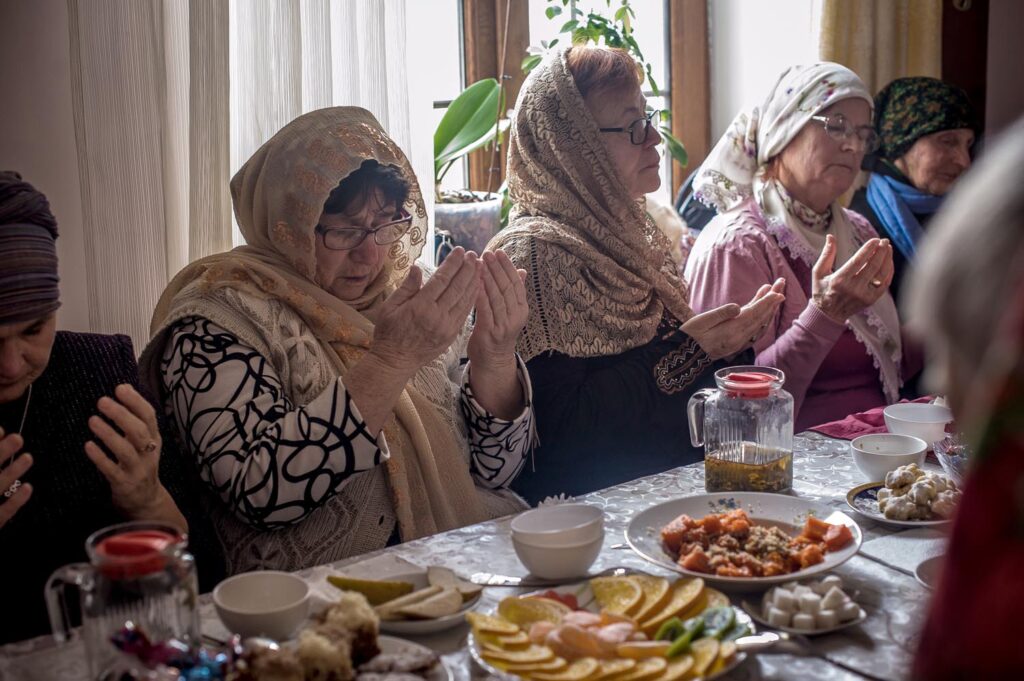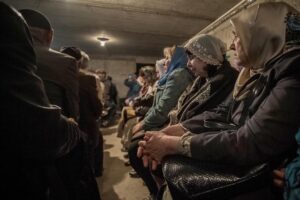The plight of Crimea returned to global attention after a rally in Moscow to mark the eighth anniversary of its annexation by Russia. On 18 March 2022, President Vladimir Putin addressed an 80,000 person crowd in the Russian capital, as attendees waved the country’s flags and sang patriotic songs.
Crimea, a Black Sea peninsula on the southern border of Ukraine, was forcibly annexed by Russian troops in February 2014. The move added the latest chapter to a centuries-long struggle for control of the region among Russian and other powers around the Black Sea littoral. The Crimean operation in 2014 served as the start of a broader offensive that would also claim broad stretches of the Donetsk region, in Ukraine’s east, as Russian territory.
Alina Smutko, a Ukrainian photojournalist, worked in Crimea from 2016 until 2019, when she was banished by Russian authorities from the region and Russia as a whole. These photos show a little-seen side of local life in Crimea: its Tatar women.

Often shy and intensely religious, the women from this conservative Muslim minority—and Smutko, a Muslim herself—offer a look into the region’s Tatar community. An endeavour all but impossible today, as Russia’s annexation of Crimea grinds into its ninth year and the Russian war on Ukraine has ballooned to nightmarish proportions.
Under ongoing persecutions and political arrests of Crimean men—frequently under spurious charges of terrorism and religious extremism—Crimean women are left to provide for their households, care for their children, and see to the legal defence of their arrested or imprisoned husbands.
Ironically, Smutko considers that it was her status as a woman that facilitated her work in Crimea. “If the local authorities thought that some non-accredited journalists were a serious threat, we [women reporters] would not have worked there,” she said.

Russia’s latest persecution of Ukrainians comes as no surprise to the Tatars, who have known long periods of similar mistreatment. The Crimean Tatar Resource Centre, an advocacy group, describes the persecution after Russia’s Catherine the Great annexed the peninsula in 1783, as the start of a “black century” for Tatars. The era would bring a “cultural war” against Tatar social and religious practices, as well as the dispossession of their homes and agricultural lands. In May 1944, amid the chaos of the second world war and on the orders of Soviet leader Joseph Stalin, nearly 200,000 Tatars were deported from Crimea to Uzbekistan and other Soviet republics.
It would take a half-century, and the fall of the Soviet Union in 1991, before Tatars could begin to return to Crimea and rebuild their communities there.

“My grandfather was 73 years old when he was finally able to return to Crimea [in the 1990s],” said Elvina Husseinova, a Tatar and the wife of a political activist who is now in prison. In 2014, Husseinova’s family faced a similar choice, when many Tatars decided to leave rather than accept the return of Russian rule.
“Each one of us made the choice to stay,” she said.
Husseinova emphasised the ongoing impact the conflict has had on the lives of her own and other Tatar families in Crimea. The arrests of brothers, sons, and especially fathers deprive them not only of those individuals, but of the male leadership–paramount in these communities– that those men provide.
“Children are growing up without their fathers,” she said. “A childhood can never be repeated, and this will stay with them forever.”

Halida Bekirova, the wife of a political prisoner, says the effect of a political arrest produces a “triple burden” for the women concerned. One has to “be a mum, replace the father as a breadwinner, and fight peacefully for the release of the husband,” she says. These tasks can feel impossible to juggle for these women, not least when required to travel on their husband’s behalf. Prison visits and court proceedings held on the Russian mainland can be thousands of kilometres away from Crimea—incurring steep costs of time, money, and energy.
“The arrest of a husband changes the lives of women and of the whole family,” says Miriam Kuku, another woman whose husband is a political prisoner.
Insult is added to injury, according to Kuku, given the absurdity of the charges given to the Crimean men under arrest and imprisonment. The implications apply to not only the men, but their families and communities also.
“An absolutely peaceful people suddenly became ‘extremists’ and ‘terrorists,’” Kuku said. Husseinova agrees: “Each one of us lives under attack.”

“An absolutely peaceful people suddenly became ‘extremists’ and ‘terrorists,’” Kuku said. Husseinova agrees: “Each one of us lives under attack.”
Others are acutely aware of history’s patterns, whether from 18th-century dispossessions or the more recent shocks of a crumbling Cold War paradigm. Past experience appears to be mirroring more recent struggles—the start of Crimea’s current annexation, and the latest resurgence of Russian aggression across Ukrainian territory.
“My generation survived perestroika,” said Margarita Djaparova, referring to the 1980s Soviet programme in which political and economic reforms, meant to revitalise the stagnating USSR, ended up hastening the bloc’s dissolution. “And my children survived the geopolitical changes of 2014.”

Perhaps it is by necessity that Tatars learned resilience. The women Smutko met, like those photographed here, spoke of their strong faith that life will return to normal—and that wrongdoers will ultimately face the consequences of their actions. The Tatar women’s patient confidence, and their common hope, offers inspiration to repressed peoples at Europe’s eastern edge and worldwide.
“Justice will prevail,” Kuku said.
Aliya Emirhussainova, also the wife of a political prisoner, feels the same. For her the question is not if, but when, such justice will be done.
“One day, these repressions will end,” Emirhussainova said. “Sooner or later, the real criminals will be punished.”



